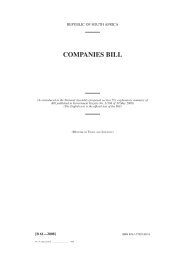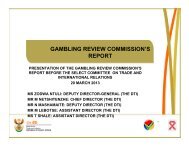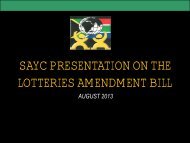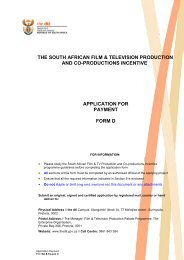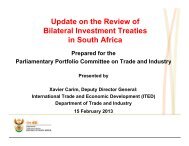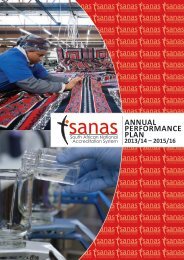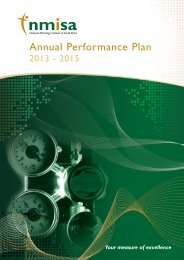Copyright Review Commission Report - ICT Law and Regulation ...
Copyright Review Commission Report - ICT Law and Regulation ...
Copyright Review Commission Report - ICT Law and Regulation ...
- No tags were found...
Create successful ePaper yourself
Turn your PDF publications into a flip-book with our unique Google optimized e-Paper software.
This essentially repeats what Lord Macaulay, then TB Macaulay, MP, said in his famous speech in the House ofCommons in 1842 in the debate on what became Talfourd's Act, viz.:It is good that authors should be remunerated; <strong>and</strong> the least exceptionable way of remunerating them is by amonopoly. Yet monopoly is an evil. For the sake of the good we must submit to the evil: but the evil ought not to last a daylonger than is necessary for the purpose of securing the good.After quoting that passage, Mr Gowers said:If the exclusive right granted by copyright ... lasts longer than it needs to, unnecessary costs will be imposed on consumers.(Gowers <strong>Report</strong>, p.50, para. 4.26.)3.1.3. <strong>Copyright</strong> law in South Africa is a creation of statute, <strong>and</strong> the earlier statutes (Act 9 of 1916 <strong>and</strong> Act 63 of 1965)closely followed the British legislation on the topic (the third schedule to Act 9 of 1916 was a reprint of the 1911British <strong>Copyright</strong> Act (1 & 2 Geo. 5, c. 46)), <strong>and</strong> even the present Act, the <strong>Copyright</strong> Act 98 of 1978 (the materialprovisions of which are set out in Appendix 4A), contains many provisions based on the British legislation <strong>and</strong>has much in common with it. It is, therefore, appropriate to begin with a consideration of the British <strong>Copyright</strong>Act passed in 1710 in the reign of Queen Anne <strong>and</strong> known as the Statute of Anne (8 Ann., c. 21). It conferredrights on authors (<strong>and</strong> through them their assigns) who had the sole right of printing books for a term of 14 yearsfrom the date of publication, <strong>and</strong> for a further term of 14 years if the author was still alive at the expiry of the first14-year term. The question as to whether there was a common law right of copyright on the expiry of thestatutory period was decided by the House of Lords in Donaldson v Becket (1774) 2 Bro PC 129, in which it washeld that there was no such common law right either because no such right had ever existed or, if it had, it hadbeen abolished by the Statute of Anne.3.1.4. Works other than books subsequently also received copyright protection, viz, engravings (in 1734), sculptures(in 1798), <strong>and</strong> drawings, paintings <strong>and</strong> photographs (in 1862). Performing rights were alsosubsequently covered by copyright (in 1833), as were musical rights by the <strong>Copyright</strong> Act of 1842 (5 & 6 Vict.c.45), known as Talfourd's Act.3.1.5. The term of copyright, which had been extended in 1802 <strong>and</strong> 1814, was further extended by Talfourd's Act,which repealed the Statute of Anne <strong>and</strong> provided that copyright in published works was to last for the life of theauthor plus seven years after his or her death, or for 42 years, whichever was the greater.3.1.6. Originally, by the Statute of Anne, only books by British authors enjoyed copyright protection. In 1838, the lawwas amended by the International <strong>Copyright</strong> Act (1 & 2 Vict. c. 59), which provided for copyright protection to begranted to foreign authors by Order in Council. After further legislation on the topic, Britain entered into a seriesof bilateral copyright conventions. In 1886, a multilateral convention was agreed at Berne, which was givenstatutory effect by the International <strong>Copyright</strong> Act of 1886 (49 & 50 Vict. c. 33). The Berne Convention, asrevised in Berlin in 1908, provides in Article 5 (2) that copyright arises automatically on the making of the work(i.e. no registration is required) <strong>and</strong> in Article 7 (1) that the minimum term must be the author's life plus 50 years.It also lays down (in Articles 3 to 5) that member states must follow the principle of national treatment, in termsof which each member state must accord works originating from other member states the same protectionit offers its own nationals. South Africa is a member of the Berne Convention, which is now administered byWIPO, which has its headquarters in Geneva. South Africa is a party to the Agreement on Trade-Related- 13 -





